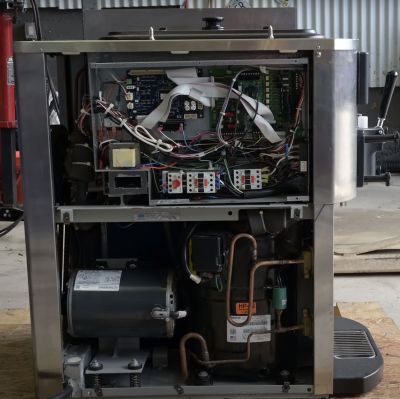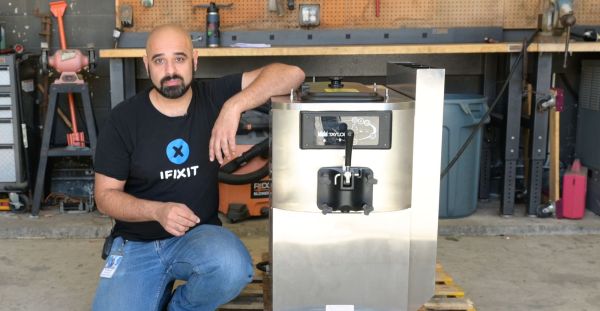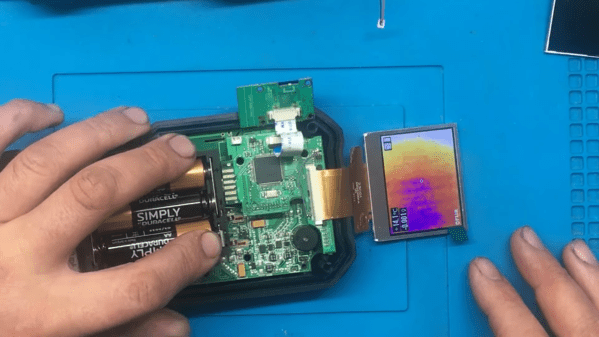Right-to-repair has been a hot-button topic lately, with everyone from consumers to farmers pretty much united behind the idea that owning an item should come with a plausible path to getting it fixed if it breaks, or more specifically, that you shouldn’t be subject to prosecution for trying to repair your widget. Not everyone likes right-to-repair, of course — plenty of big corporations want to keep you from getting up close and personal with their intellectual property. Strangely enough, their ranks are now apparently joined by the Church of Scientology, who through a media outfit in charge of the accumulated works of Church founder L. Ron Hubbard are arguing against exemptions to the Digital Millennium Copyright Act (DMCA) that make self-repair possible for certain classes of devices. They apparently want the exemption amended to not allow self-repair of any “software-powered devices that can only be purchased by someone with particular qualifications or training or that use software ‘governed by a license agreement negotiated and executed’ before purchase.
right to repair57 Articles
The McDonald’s Ice Cream Machine Saga And Calls For Right To Repair

Raising a likely somewhat contentious topic, iFixit and Public Knowledge have challenged the manufacturer behind McDonald’s ice cream machines to make them easy to diagnose and repair. This is a subject that’s probably familiar to anyone who is vaguely familiar with US news and the importance of ice cream at McDonald’s locations to the point that a live tracker was set up so that furtive customers can catch a glimpse at said tracker before finding themselves staring in dismay at an ‘Out of Order’ sign on one of these Taylor ice cream machines.
The story is more complex than just a machine being “broken”, however. The maintenance contracts are lucrative, the instruction manual is long, and the error codes are cryptic. When you add to that the complexity of cleaning and maintaining the machines, it’s tempting to just claim the machine is out of order. These Taylor machines (the C602 and the C709 from the iFixit video) are a bit more complex than your usual ice cream maker in that they also have a pasteurization element that’s supposed to keep already poured mix safe to use the next day.
Continue reading “The McDonald’s Ice Cream Machine Saga And Calls For Right To Repair”
The World’s First Agricultural Right To Repair Law
Long time readers will know that occasionally we mix up our usual subject matter with a dash of farm equipment. Usually the yellow and green variants that come from John Deere, as the agricultural manufacturer has become the poster child for all that is wrong in the fight for the right to repair. An old Deere is worth more than a nearly new one in many places, because for several years now their models have had all their parts locked down by DRM technologies such that only their own fitters can replace them. Now after a long legal fight involving many parties, the repair and parts company iFixit sound justifiably pleased as they announce the world’s first agricultural right to repair law being passed in the US state of Colorado. (Nitter)
This may sound like a small victory, and it will no doubt be followed by further rearguard actions from the industry as similar laws are tabled in other states. But in fact as we read it, with this law in place the game is de facto up for the tractor makers. Once they are required to release any access codes for the Coloradans those same codes will by extension be available to any other farmers, and though we’re guessing they won’t do this, they would be best advised to give up on the whole DRM idea and concentrate instead on making better tractors to fix their by-now-damaged brands.
It’s exciting news for everybody as it proves that right-to-repair legislation is possible, however since this applies only to agricultural machinery the battle is by no means over. Only when all machines and devices have the same protection can we truly be said to have achieved the right to repair.
We’ve reported on this story for a long time, here’s a previous piece of legislation tried in another state.
Europe’s Proposed Right-To-Repair Law: A Game Changer, Or Business As Usual?
Recently, the European Commission (EC) adopted a new proposal intended to enable and promote the repair of a range of consumer goods, including household devices like vacuum cleaners and washing machines, as well as electronic devices such as smartphones and televisions. Depending on how the European Parliament and Council vote in the next steps, this proposal may shape many details of how devices we regularly interact with work, and how they can be repaired when they no longer do.
As we have seen recently with the Digital Fair Repair Act in New York, which was signed into law last year, the devil is as always in the details. In the case of the New York bill, the original intent of enabling low-level repairs on defective devices got hamstrung by added exceptions and loopholes that essentially meant that entire industries and types of repairs were excluded. Another example of ‘right to repair’ being essentially gamed involves Apple’s much-maligned ‘self repair’ program, that is both limited and expensive.
So what are the chances that the EU will succeed where the US has not?
Continue reading “Europe’s Proposed Right-To-Repair Law: A Game Changer, Or Business As Usual?”
You Can Now Fix Your Deere
Over the last few years we have brought you many stories about John Deere tractors, and how their repair has been locked down such that only manufacturer-authorised technicians can work on them. They’ve become a poster child in the battle for the right to repair, a symbol of the worst practices. Finally now we can bring you some good news of sorts, as the agricultural giant has signed a memorandum of understanding with the American Farm Bureau Federation to ensure that their products will henceforth be repairable by people without Deere approval.
We can’t imagine that Deere will have taken this step willingly, and while we’d like to imagine that consumer protests in favour of right-to-repair have hit their mark, we’re guessing that it’s more of an economic pressure at work alongside the threat of legislation outside their native America. If farmers getting caught out waiting for a Deere van to arrive while their crop withers in the field wasn’t enough, when the price of a second-hand tractor without the DRM outstrips that of a newer one with it, eventually the sales of new tractors will also suffer.
So this is good news, and we’re guessing that other agricultural manufacturers doing the same DMCA practices will now follow suit. But it’s not a complete victory. The problem starts not with the DMCA restriction itself, but with the extension of the machine’s computer system into every part, including those many parts which simply don’t need it. It’s not a complete victory if anyone can now use the software to register a new hydraulic valve with the system; instead that hydraulic valve should not have to be authorised in the first place. It’s this creeping unnecessary complexity which is the true enemy of right-to-repair, and we shouldn’t forget that.
Header image: Dwight Sipler, CC BY 2.0.
Non-Replaceable Battery? Not If This Proposed EU Law Passes!
A disturbing trend in consumer electronics has been a steady disappearance of replaceable batteries on our devices. Finding a mobile phone with a swapable battery is a struggle, and many other devices follow the trend by sealing in a Li-Po cell. The result is an ever-shorter life for electronics, and a greater problem with devices going to recycling or worse still, landfill. Hope is at hand though, thanks to a proposed European Union law that would if passed make batteries in appliances “designed so that consumers can easily remove and replace them themselves“.
In case any readers in the rest of the world wonder what it has to do with them, the EU represents such a huge market that manufacturers can neither ignore it, nor in most cases afford to make separate EU and rest-of-world versions of their products. Thus if the EU requires something for sale in its territories, in most cases it becomes the de facto norm for anything designed to be sold worldwide. We’ve already seen this with the EU’s right to repair legislation, and while we have not doubt that manufacturers will do their best to impede this new law we don’t think they will ultimately prevail.
Via 9to5Mac.
Cheap Display Fix Brings Thermal Camera Back To Life
When it comes to repairability of electronic devices, much depends on how helpful the original manufacturer is. Some make repairs very easy by publishing detailed service manuals and selling spare parts. Others keep everything under wraps to protect their intellectual property, turning even a supposedly simple fix into a reverse engineering ordeal. When [BuyItFixIt] got his hands on a FLIR multimeter-thermal camera combination instrument with a broken display, he quickly found that FLIR was firmly in the “all our designs are top secret” camp and wouldn’t even tell him what kind of display they had used.
Not to be deterred, [BuyItFixIt] took the meter apart and tried to find out what was going wrong. The signals from the microprocessor seemed to reach the display OK, so the fault was somewhere in the screen itself. The display’s part number didn’t return any useful results online, but AliExpress did have a very similar-looking display available with a slightly different part number. This display seemed to work at first, but the instrument then got caught in a boot loop.
Unlike FLIR, the supplier of the replacement display was happy to supply datasheets, and even had one available for the original FLIR part. With this new information [BuyItFixIt] was able to deduce that the new screen didn’t output one signal that the processor expected to see, causing it to reset itself. A simple workaround was to connect the corresponding pin to a PWM signal from the backlight controller, which fooled the CPU into thinking the proper display was connected.
In this case, a $12 display and a single piece of wire were enough to bring an expensive instrument back to life, but things are not always that simple. More complex machines can take weeks to debug, even if parts are available. If not, you might even need to design your own. Continue reading “Cheap Display Fix Brings Thermal Camera Back To Life”

















